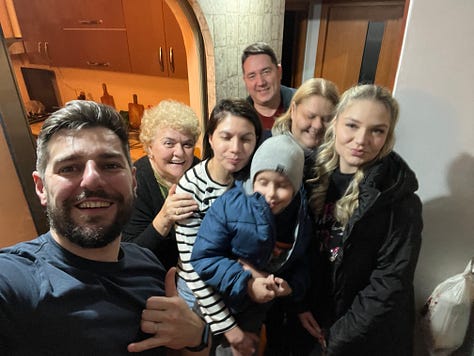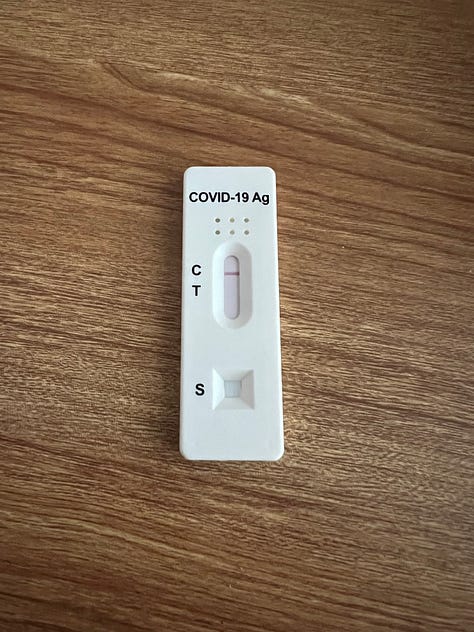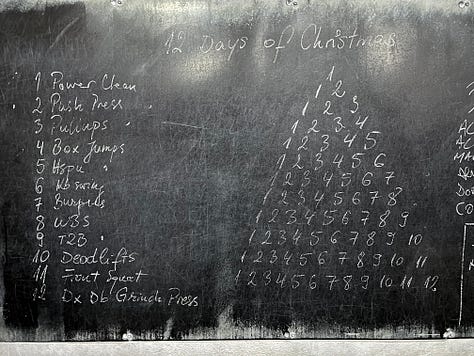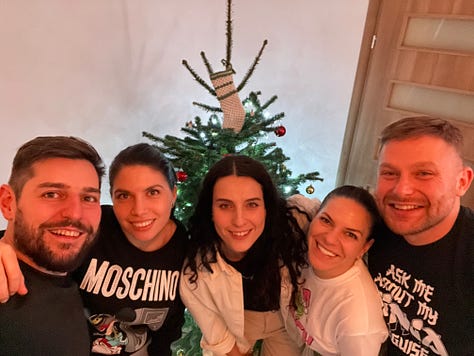#37: 2023 Christmas Edition and Yearly Planning
Taking some time to relax while also planning for the year ahead
Hey friends,
Merry Christmas to the ones of you who celebrate it, and happy holidays to the rest!
I was one day late with the newsletter because I knew you had better things to do on Christmas morning.
1/ A few updates from my side
Last week was interesting, as I struggled with a nasty cold for the first part. I was lucky enough to be through with it on Thursday or so, which meant I could do the traditional CrossFit workout of “12 days of Christmas.”.
Even though I finished last, I still had fun.
We had a Secret Santa mini-party with friends on Friday evening, and I got the best cup in the world! I love it.
I also got a bit nostalgic, as I did a COVID test for the first time in more than a year, I think. As we planned to go home to my mom for Christmas Eve, I wanted to ensure it was safe.
It was negative, so we went to celebrate the first part of Christmas with my sister and her family.
It was a good day; we ate a lot, laughed a lot, and told many stories.






We’re already back in Bucharest, though, as we wanted some days to relax and plan for the year ahead.
Here’s how I do it.
2/ Planning the year ahead
Between meals and celebrations, I advise you to take 1-2 hours one day and plan for your next year.
Here’s how I do it.
The Framework
I will list the steps below and discuss them further in more detail.
Review your past year
Assess your priorities based on your life’s interests
Define goals according to those priorities
Plan activities to reach those goals
Regularly review
Celebrate
Now let’s take them one by one.
1. Review your past year
Think about what happened over the year. If we had goals, how many of them did we fulfill? If you haven’t, just think about what went on in your life.
First, go through the things that stick out. Like changing your job, running your first half-marathon, or maybe a dinner that you remember. Your Birthday party, time spent with your kids, some bad news, etc.
Then, I suggest you take your calendar (or calendar app) and go month by month. What were the things that brought you happiness, and what made you sad?
Go through the list and find patterns. What were the circumstances or people that brought joy to your life? What about things that made you nervous or just unhappy?
Take these insights into your plan for the new year.
2. What are your interests? The Wheel of Life
The next step is to think about the areas in your life. This exercise could have different results for everyone.
Coaches use what is called “the wheel of life,” and it might include the following:
Family and Friends
Significant Other
Career
Finances
Health
Home Environment:
Fun & Leisure
Personal Growth
Now, take the areas and think about how satisfied you are with that particular area. Grade that from 1 to 10. So let’s say you take a minimal approach with only five areas.
Relationships: 7/10
Health: 6/10
Finances: 4/10
Job/Study: 8/10
Hobbies: 9/10
P.S. I recommend a free online test for this, for Michael Hyatt’s life areas. Take the test here: https://assessments.michaelhyatt.com/lifescore/
Of course, some might be important for you and some might not. There is no equal sign between the areas. If you are a student, for example, the “Finances” part might not be as important as it would be for someone with a family and a mortgage.
With this in mind, you can decide in what areas you want to make improvements this year.
(Hint: don’t try to get a 10/10 for each of them because that’s impossible.).
Just start small.
If you want it to look nice on a radar chart, copy this sheet.
3. Define goals according to those priorities
Let’s say you identified the areas in which you want to make improvements:
Health
Finances
Relationships
Now, your next step would be to define some goals regarding these areas. I recommend having no more than three goals.
Write down your SMART Goals and the needed activities
Go to the gym at least 12 times a month
Drop my body fat to 21% by September 1st
Save at least 20% of my income every month
Read 10 books on Project Management in the first 6 months
Just make sure these goals are a stretch but realistic still. Psychology tells us that if a goal is not challenging enough, we will get bored, and if it’s too difficult, we will drop it as soon as we face challenges.
Also, make sure you write down your goals. A study made at the Dominican University in Chicago states that if you write down your goals you are 1.4 times more likely to achieve them.
So write them down on a piece of paper, in your notebook, or in your to-do app. Or just in an Excel file.
Then, prepare a little for them. Draw up a high-level plan of activities that you would need to do to achieve your goals.
So, if your goal is to lose 10kg you can detail the plan like this:
Research meal plans
Throw away all the sweets in the house
Ask around for a personal trainer
Meet with the personal trainer
Buy gym clothes
Buy running shoes
Go to the gym 3 times a week
Run once a week
Cut down alcohol
Research ways to sleep better
Go to sleep earlier
Every Sunday prepare the meals for your week
Of course, this is just an example but you get the picture.
4. Plan your goals
As the focus is very important, spread your goals across the year. Don’t have five goals that you start working on in January and need to be done by April.
Based on priorities and the high-level plan you just sketched, set some goals starting in January, some in April, and some in August. If you don’t start small and precise, you’ll fail for sure.
Also, make sure you understand how long it would take to fulfill a goal. If you set your goal of losing 10kg in November, there are high chance you won’t be able to do it.
5. Regularly Review and Re-plan your Goals
At least every 3 months, go through your list of goals and understand their status.
Maybe you completed some of them; maybe some are no longer relevant. We need to be scientists in every aspect of our lives. Always check what works and where we can improve.
So I recommend having a quarterly review. In this way, you can make sure your goals are still relevant and that you are making progress towards them.
Also, use this moment to give up on some of those goals and maybe get new ones. This is one thing that’s wrong with the New Year’s resolution.
You set some goals at the beginning of the year, and if life happens, you either forget about them or just don’t remember to adapt those goals.
Your ideal week
At the beginning of each week, design your “ideal week.”.
You go through your calendar, and based on your goals, you block time for everything you need to do to accomplish them.
You start at your ideal waking time and end at bedtime.
This doesn’t mean things won’t change.
But it’s a compass to let you know that if all things go perfectly, you don’t need to worry each day about what you need to do to make things happen.
6. Celebrate
If you have the discipline, put in the work, and adapt, you will surely start marking goals off the list.
Sooner than later, you will succeed in achieving your goals.
Always remember to celebrate. No matter how easy or hard it was to attain the goal, mark the event somehow.
Go to a movie or for a long walk; drink a glass of Prosecco; whatever makes you happy.
It’s important for your brain’s “lizard part” to associate goal fulfillment with pleasurable moments.
Conclusions
Jocko Wilink, the former Navy Seal officer turned writer, has a book called “Discipline Equals Freedom.”. And this is a concept that I truly embrace. But I would take it down a notch by saying, “Clarity equals freedom””
Before having the discipline to take action, we need to be clear on where we want to go and who we want to be.
And these questions will probably take a lifetime to answer, but let’s look ahead to just one year, or better yet, one day.
So, live your best year, one day at a time.
3/ Recommendations: My top 5 books of the year
I haven’t read that much this year, as I was focused a lot more on writing and taking action.
That doesn’t mean I ignored it altogether.
Here are my top 5 books of 2023.
Interestingly enough, three of them are autobiographies, and I have loved reading them lately.
"What Got You Here Won't Get You There" by Marshall Goldsmith: This book provides insights into the subtle changes successful people need to make in their professional behavior to advance to the next level in their careers.
"The Ride of a Lifetime" by Robert Iger: This memoir by retired and now active-again Disney CEO Robert Iger shares lessons learned over his 15-year tenure, exploring the complexities of leadership and the relentless pursuit of excellence in the media industry.
"Outlive" by Peter Attia: This book focuses on longevity and healthspan, offering science-based insights and practical advice on how to extend your life and improve its quality through various lifestyle, nutritional, and medical strategies.
"Friends, Lovers, and the Big Terrible Thing" by Matthew Perry: This memoir by the late actor Matthew Perry delves into his struggles with addiction and fame, offering a candid and often humorous look at his life on and off the screen.
"I'm Glad My Mom Died" by Jennette McCurdy: In this memoir, actress Jennette McCurdy discusses her complicated relationship with her mother, her experiences as a child actor, and her journey toward healing and self-discovery.
I’m curious. What was the best book you read in 2023?
Thank you for reading, and let me know if you liked something in particular in this newsletter.
Until next time,
Leo
P.S.: If you want to read my content daily, don’t forget to follow me on Twitter and Linkedin.
P.S. 2: If you want to take your productivity to the next level, check out my extensive Productivity course that can accelerate your career.



